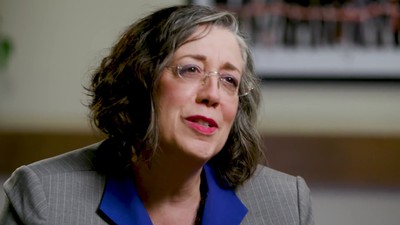Dr. Carmel Dyer at Aging Seminar

"Never has it been so cool to talk about aging."
Those were the words of Dr. Carmel Dyer, MD, a professor of geriatric and palliative medicine at UT Health and the executive director of the UT Health Consortium on Aging, as she joined Professor of Orthopedic Surgery at UT Health in Houston and Steadman Philippon Research Institute Chief Scientific Officer Dr. Johnny Huard in opening the 2nd Annual Symposium on Aging Research at the University of Texas Health campus in Houston in late June.
"We are not here to find ways to the fountain of youth," said Dr. Huard to the symposium audience. "We can't stop aging but we certainly can try to find ways to make our aging years better, healthier and more productive."
"I speak with my elderly patients every day," said Dr. Dyer, "and the biggest fear they have for their health is not cancer or heart disease but the possibility of a dementing illness. The key to dementia is not treatment but prevention."
"Somewhere in every 75-year old body," said UT Health professor and panelist Myriam Fornage, "there is a 25-year- old wondering 'What in the hell happened?'"
Finding solutions to these concerns was the center of discussion at the Houston conference which featured nearly 20 speakers who represented some of the top aging experts and researchers in Texas and other parts of the world.
The two-day conference covered topics such as the genetics of aging and clinical translation, metabolism and aging, tissue engineering and regenerative medicine and stress and age-related degenerative disorders.
With those subjects being covered, much of the content delivered by the speakers was quite technical in nature and specifically geared to the audience of scientists and researchers.
Dr. Dyer, though, tied all the topics together and closed out each portion of the symposium with a brief recap – in more everyday terms – for the audience seeking more information on the study of aging.
Ranked in the top 1 % of geriatricians by U.S. News and World Report, Dr. Dyer was the perfect panelist to offer the summaries and recaps at the conclusion of each session. She has specialized in geriatric medicine for her entire career, was a delegate to the 2005 White House Conference on Aging and has twice provided testimony to the U.S. Senate on behalf of vulnerable elders.
After years of treating aging patients, Dr. Dyer has a pretty good feel for what her patients are thinking and what they need in their later years.
"None of us wants to be dependent on others for our daily living," said Dr. Dyer. "People are beginning to accept that they just might need a little leg up. Maybe your eyesight is not good enough to drive a car any more but you can use Uber, or work with people from the neighborhood to get you places. Public transportation in big cities continues to improve. People can kind of accept that sort of change in aging.
"When you can keep your muscles and bones strong, you have an overall better sense of well-being," added Dr. Dyer. "You're less likely to get hurt. You can move more quickly and you can rise from chairs. We can't prevent all aches and pains but they can be reduced through exercise, joint replacements and building better muscles."
Dr. Dyer's acknowledgement of improving the aging process through exercise, joint replacements and building better muscles is not lost on people familiar with the work of Dr. Huard and the world-class orthopaedic surgeons at The Steadman Clinic and UT Health. After all, those strategies for battling aging align closely with one of the main mission statements at TSC -- helping patients recover more quickly with less pain and return to normal activity.
How does Dr. Dyer, a noted geriatric specialist, see the work of Dr. Huard and others in the search for ways to better the aging process?
"We are all on a course where we continue to age," noted Dr. Dyer. "Our heart, bones, muscles, internal organs – all change as we get older. What Dr. Huard and his associates are trying to do is arrest that decline so that we can somewhat maintain our desired lifestyle as we grow older.
"The advances in joint replacements and stem cell research in recent years continue to fascinate me," said Dr. Dyer. "These are the types of treatments we can now give in medicine that will help us all maintain strength and mobility in our bodies as we reach our 60s, 70s and 80s."
What is it about geriatric medicine or the idea of aging that makes Dr. Dyer continue to want to learn more about it?
"I see how even a little change in an older patient... even if you could get them to graduate from a walker to a cane . . . can make a big difference in their life. Now maybe they can climb upstairs if they don't need that walker. They can move around more freely on their own and maybe go visit their grandchildren instead of waiting for the kids to visit them.
"It's often just the little changes that have the most effect," continued Dr. Dyer. "Sometimes if we adjust the medication just slightly they improve their physical functions, they get a noticeable change in brain function. I'm thrilled when I see a small change done with forethought because of training in geriatric medicine. When we use the right mix of geriatric medicine, people feel better and improve. At the very least, we have stopped the progression of disease sometimes. They are grateful because they have maintained independence and good cognitive function."

